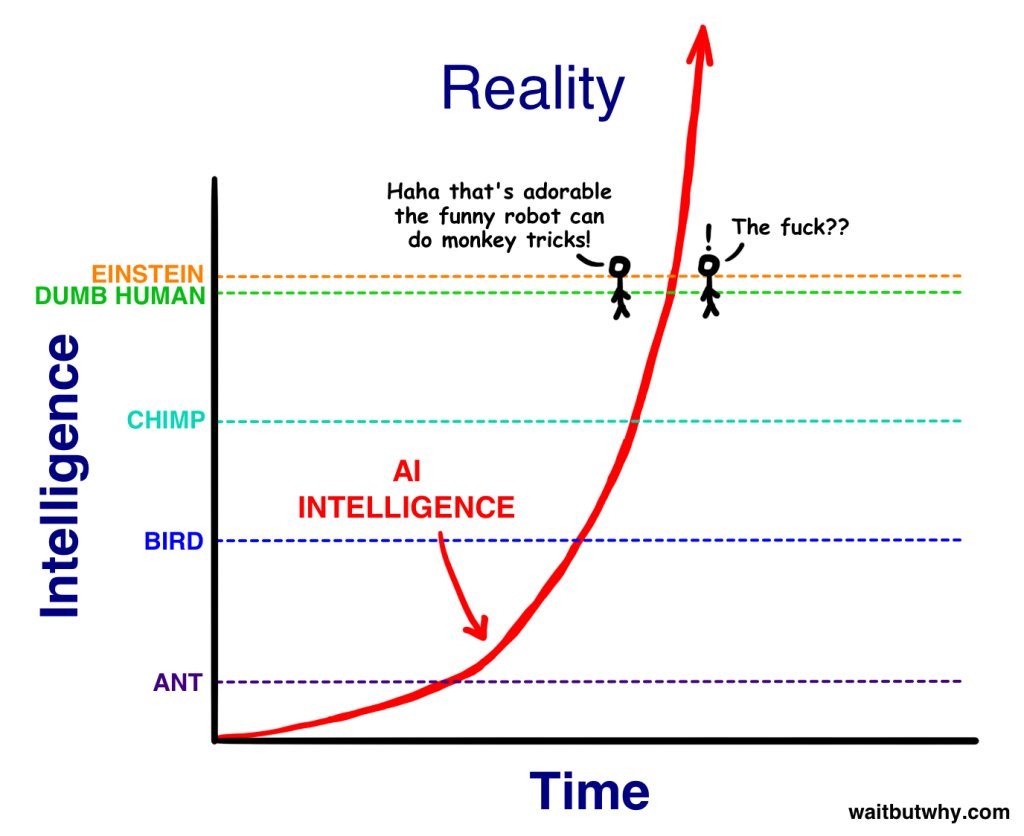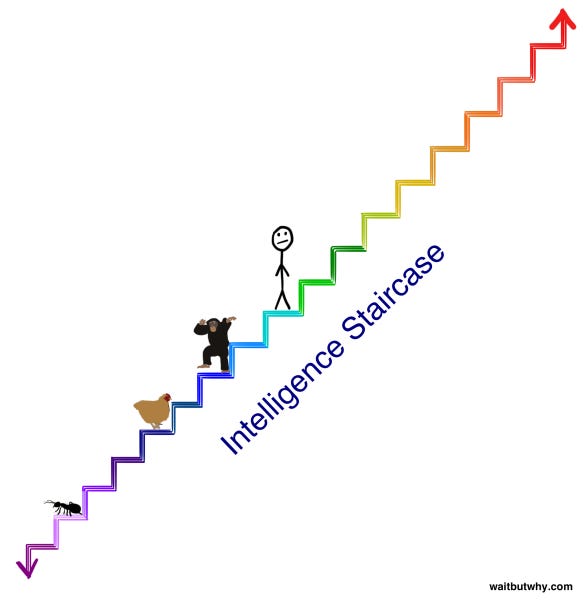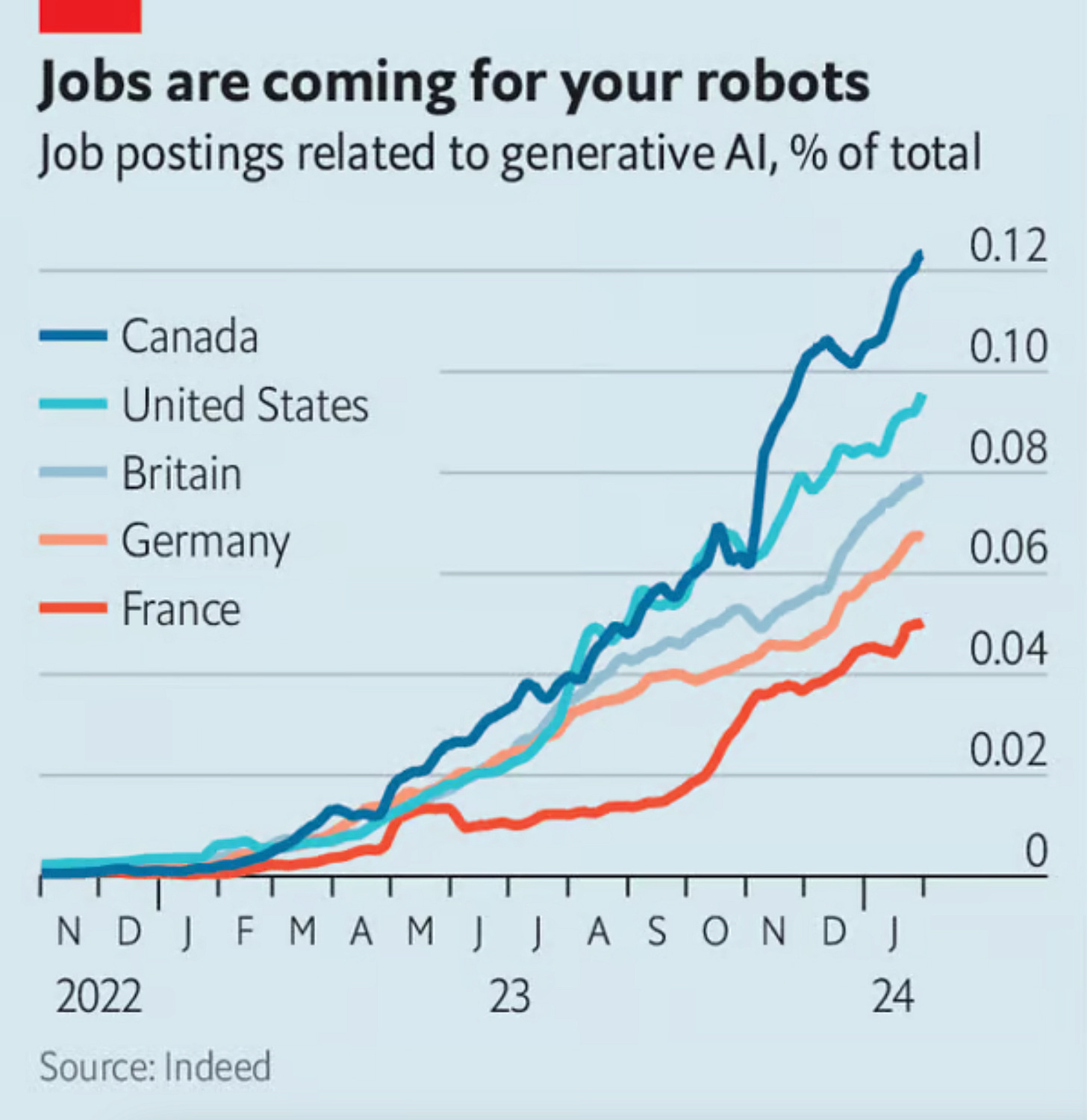AI and the Future of Work
Q1 2024 Update
This week there will be three articles:
In this quarterly update, I focus on the future of AI and work
On Wednesday, I’ll share with you a more detailed announcement for the storytelling course!
The premium quarterly update this week is about GeoHistory. I will touch on California, how big are cities, how the Panama and Suez canals changed the world’s shipping, what happened when Poles took over Prussia, the flaw in settler colonialism, the evolutionary underpinnings of the uncanny valley, an illustration of how the world is determined by systems, why Europe is not as doomed as we think, an illustration of why there are no hurricanes at the equator, Burma’s armed resistance, why the recent tensions between Ethiopia and Somalia, and longer updates on Egypt’s pyramids and water, and the latest on Israel and Palestine, most notably the UNRWA opportunity.
Also, this Thursday I will debate publicly with Dan Visioni, an assistant professor at Cornell University studying Climate Intervention! It will be on Twitter Spaces at 9am PST / 12pm EST / 6pm CET (Europe).
I love AI, but I’m very concerned about it.
When Is AGI Coming?
The new Claude that was just released defines itself as self-aware.
Of course, Claude and similar LLMs are just next-word predictors. They are not self-aware. They were just fed all the science-fiction about AIs and their takeover, and they regurgitate that. For a real LLM to become self-aware, it would need to be more intelligent than humans and be able to self-improve. They aren’t, and they can’t.
Right?
Right?!
OK so Anthropic’s latest Claude is now more intelligent than the average human being according to Mensa tests. Faaaantastic.
But they can’t self-improve, can they? Well, researchers are working on it. I think we’re months away from AIs that can start improving themselves, if we’re not there already.
How is this possible? Shouldn’t we know this? No, because if we did, it would be dangerous. According to the Chief Scientist of OpenAI, in an email exchange with Elon Musk:
If we were getting close to FOOM, would we know then?
I recall how just a few years ago we imagined all this research happening in locked-down labs with vacuums and all sorts of mechanisms protecting us from AGIs going rogue, but it turns out there are thousands of people playing with AIs fully connected to the Internet. It looks like we’re careening towards FOOM.
When is it coming, and how bad is it?
The market hasn’t budged: It still predicts that AI will go FOOM and become super intelligent at some point in the early 2030s.
That’s starting in 6 years.
Tim Urban has a nice way to convey this concept:
We’re just between the “dumb human” and “Einstein” levels right now.
And how bad will it be? Again Tim Urban: This is human intelligence
And this is Artificial SuperIntelligence’s potential:
Since we can’t predict what an ASI would think, but we can speculate, many experts have done exactly that. The average AI engineer thinks that there’s roughly a 40% chance that AI destroys the world.
One of the founders of neural networks now thinks there’s a 10% chance. It doesn’t really matter whether it’s 10% or 90%. Anything above 5% should mean: Stop everything and focus only on this problem.
When Will AI Take Your Job?
While we wait for a decade for AIs to maybe kill us all, we can still lose our job to them. In this paper, scientists asked thousands of AI experts when they thought certain jobs would be automated. They asked in 2022 and again in 2023, to see how their predictions changed. The answer: a lot.

Experts think within a decade, AI will author NYT best-sellers, write top pop songs, fold laundry, and more. And since these timelines are compressing now, we can imagine they will compress further!
In Customer Service
A pretty basic version of a customer service bot has replaced 700 full time agents at Klarna. The bot is more accurate, leading to 25% fewer repeat inquiries, resolving most inquiries within 2 minutes rather than 11 minutes. Available in 23 markets, 24/7, in 35 languages, it saves Klarna $40M per year.
I’m not surprised. When I was Chief Product Officer of a startup a year or so ago, we were looking into this and it was clear we wouldn’t eliminate all customer service, but we would eliminate a big chunk of it, because most people have pretty basic questions that can be easily solved. You can automatically reply to these requests, leaving your humans to solve much more interesting and complex issues.
Which means elite customer service representatives might get more interesting cases in the future, but the job of the vast majority is probably doomed.
In Massage?
What about massage therapists? I don’t think we’re there yet, because hand texture, muscles, and precision are hard to mimic, but we’re moving in that direction:
In Copywriting
In Illustration
If you can create any composition with any style and it looks good, the need for illustrators will shrink further.
In Modeling
Models who have the face you want, the body you want, the personality you want, can switch clothes and background whenever you want, work 24/7, be everywhere at once… Who can compete with that?
Created by Ruben Cruz, founder of the Barcelona-based modeling agency The Clueless, her account has 187,000 followers and it's growing fast! He decided to design López after having trouble working with real models and influencers. He explained that López was designed with a distinct "personality" based on what society finds most appealing.
In Movies
In case you haven’t seen Sora in action:
After which Tyler Perry stopped his $800M studio expansion:
'Being told that it can do all of these things is one thing, but actually seeing the capabilities, it was mind-blowing,' he said in an interview with The Hollywood Reporter on Thursday, noting that his productions might not have to travel to locations or build sets with the assistance of the technology.
As a business owner, Perry sees the opportunity in these developments, but as an employer, fellow actor and filmmaker, he also wants to raise the alarm. In an interview between shoots on Thursday, Perry explained his concerns about the technology's impact on labor and why he wants the industry to come together to tackle AI: 'There's got to be some sort of regulations in order to protect us. If not, I just don't see how we survive.'
In Translation
Duolingo just laid off 10% of its contractors because AI can translate a lot of its content:
We just no longer need as many people to do the type of work some of these contractors were doing. Part of that could be attributed to AI.
This post from An Qu is fascinating. He studies a rare language, Circassian, for which there’s very little content online. They explain how Claude didn’t know enough Circassian from Internet content, but they gave it some Circassian content that isn’t available anywhere online, and just from that it learned enough of the language that it could translate seamlessly, but also understood the grammar and morphology at a deep enough level that it was able to analyze sentences and even form valid neologisms—new words.
If it can do that, imagine what it can do for other types of translations!
AI Assistants for Everything
One of my visions for what will happen in a few years is that we will all have dozens of assistants running in parallel all the time, sending messages to others and buffering us from their replies. Soon, 90% of all communication will be AI to AI, happening behind the scenes the way server calls happen today.
A prime example is this:
A man programmed ChatGPT to talk with thousands of women on Tinder… and eventually found his wife. If I were him, I would productize and sell that GPT. It’s only weird because it’s new. It will be normal in a few years.
What happens when technology replaces jobs suddenly? We’ve seen it before.
Sudden Replacement in Phone Operators
In the early 1900s, 15% of working women were telephone operators!
Between 1920 and 1940, AT&T undertook one of the largest automation investments in modern history, replacing operators with mechanical switching technology in over half of the U.S. telephone network. [Veteran] telephone operators were most impacted, and a decade later more likely to be in lower-paying occupations or no longer working.—Answering the Call of Automation: How the Labor Market Adjusted to Mechanizing Telephone Operation
If You Can’t Beat AI, Join It
Remote Workers
If AI doesn’t take your job, maybe a remote worker will. They’re going after jobs traditionally safe from offshoring.
But remote workers will only replace locals if they’re more productive. I’ve reported recently that it’s not clear whether remote work increases or decreases productivity. A key aspect could simply be culture: In a paper based on Indian workers, it decreased productivity, while it increased it in a paper based on Chinese workers.
This sounds intuitive to me: Remote work is new, and we don’t yet know how to optimize it compared to the office. I believe that, as we learn, remote work will, on average, perform better than office work.
How One City Is Fighting for Remote Workers—and Winning
In The Fight for the Remote Worker, I claim that attracting remote workers is an amazing business for cities and countries: They can pay tens of thousands of dollars to attract them, and recoup that amount in a matter of months.
Apparently, Tulsa tried it by offering each remote worker $10,000 to come, and the results are in. From that article:
At the end of 2022, Tulsa Remote had brought in almost $307 million in direct labor income to the economy.
For every two Tulsa Remote members who move to the city, three more come with them.
Going back to 2019, out of everyone who has completed a year there to date, 76% have stuck around.
Tulsa Remoters saw their real incomes go up by $26,500 a year more than those who had been accepted but hadn’t yet moved to the area. And their productivity did not fall, even with the move.
Local residents saw a 1.28% increase in their average welfare as wages rose from remote workers spending their salaries on local goods.
Tulsa Remote estimates the new demand created 722 local jobs and added almost $40 million to locals' incomes.
The local service sector saw a 7.95% increase in employment, most likely because of how much remote workers spent.
The remote workers coming in aren’t newcomers in search of a job. That’s also key, as the paper’s author notes: “They will not compete with local residents for local jobs.”
I know governments are quite slow on average, but this is such a no-brainer that I expect the fight for these workers to increase relentlessly in the coming years.
Improve Yourself
If you want to compete against AI and remote workers, you better differentiate yourself.
In How to Become the Best in the World at Something, I explained how every person should be good enough in several areas, so that they’re unique with respect to their combination. Another take on a similar topic is the “T-shape”: People who’re good at many things and go deep in one area:

I find that this is good if you want to be promoted in that area of expertise. So it’s a good way to progress early on. But nobody breaks out with this, because nobody is special with a single deep area of expertise. You need a combination of areas where you have expertise depth, but you don’t need to be world-class in any of them.
I hope you enjoyed this! As a reminder, this is what you’ll find in the Premium Quarterly Update later this week:
California updates
How big are cities really
How the Panama and Suez canals changed the world’s shipping
What happened when Poles took over Prussia
The flaw in settler colonialism
The evolutionary underpinnings of the uncanny valley
An illustration of how the world is determined by systems
Is Europe doomed?
An illustration of why there are no hurricanes at the equator
Why Burma’s armed resistance is where it is
Why the recent tensions between Ethiopia and Somalia emerge from a fundamental Ethiopian problem
Why Egypt’s pyramids are where they are
The latest on Israel and Palestine, most notably the UNRWA opportunity

















Nice update! What are your thoughts on something like UBI? Have you ever pondered on what a post ASI economy looks like?
I think you’re leaning too doomer on AGI. The particulars of FOOM is not just whether the AI is connected to the internet, but whether it can spread onto other compute substrate. While most AI runs on GPUs, it requires extremely high memory bandwidth and precision networking. It’s not clear that a genius AI would be able to increase its intelligence by gobbling up more compute. Additionally, as of right now, the compute necessary for superintelligence would require improvements all the way down the stack of semi conductors and increased production, as well as an order of magnitude more electric power. There are dozens of limiting factors that depend on processes whose speed is dampened by reality (R&D, manufacturing, mining, etc.).